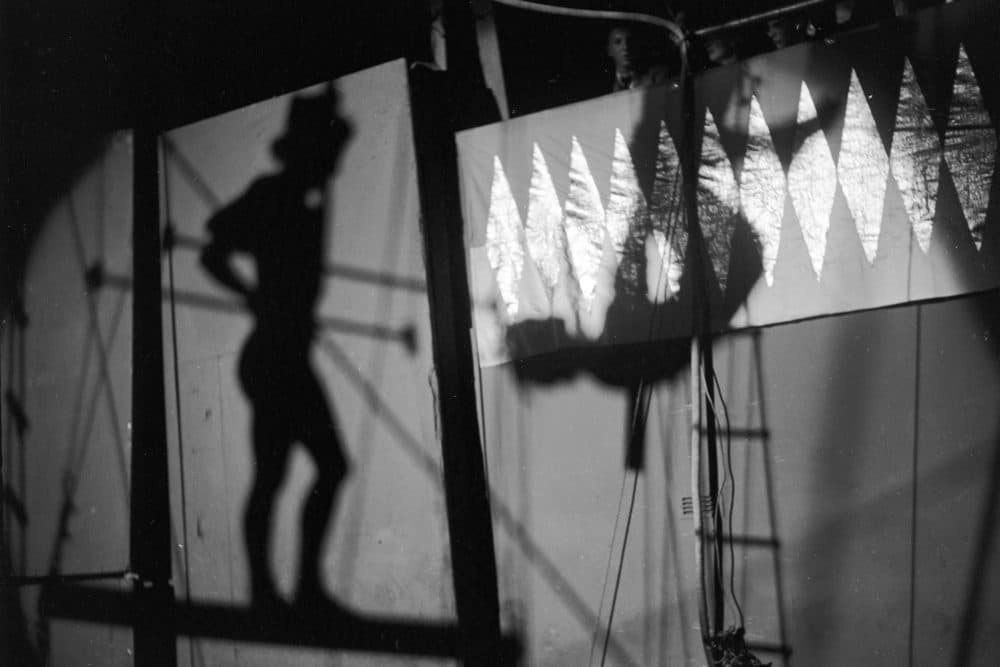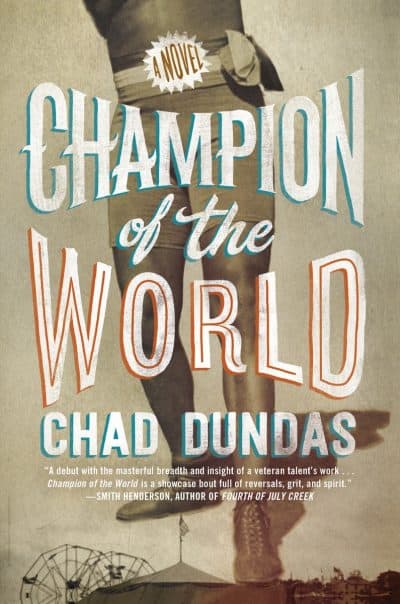Advertisement
The Hangman's Drop Returns In 'Champion Of The World'
Resume
Chad Dundas weaves wrestling-related history (both real and slightly fictionalized) through his debut novel, "Champion of the World." Set in the 1920s, the story follows Pepper Van Dean, a former lightweight champion who finds work as a member of a traveling carnival.
Dundas treated Only A Game to a dramatic reading (click the play button above to listen) and then spoke with Bill Littlefield about first sentences, the 1920s wrestling scene and false teeth projectiles.
BL: I am a devotee of great first sentences, and I have to wonder... after you had written "The clowns came to get him when it was time for the hanging," how did you write the next sentence? Weren't you afraid you'd ruin everything?
CD: [Laughs] Well, when you get that first sentence right, after that, it's only 479 more pages. But the truth is, that's obviously not the first first sentence that I thought of. I don't remember any of the other original opening lines for the novel, but when I wrote, "The clowns came to get him when it was time for the hanging," there was a feeling that that was the one.
BL: I sometimes wonder if George V. Higgins sat down to write "The Friends of Eddie Coyle" and immediately wrote, "Jackie Brown, 26 years old, with no expression his face, said he could get some guns."
CD: [Laughs] I'm gonna guess no, but who knows, man. Some people are just masters.
BL: Tell me a little bit about the character who actually performed the Hangman's Drop in circuses.
CD: The hangman's drop was a real carnival performance that wrestlers and strongmen did for a while during the heyday of traveling carnivals. The exact details of how it's performed in the book are fictionalized, because it's a little bit difficult to find accounts of the blow-by-blow of how it went during those carnival performances and especially difficult to find accounts that are credible in any way.
But it is a performance that was actually accomplished by wrestlers, and one of the most famous practitioners of it was a guy by the name of Martin "Farmer" Burns, who was a very prominent wrestling trainer in the late 1800s and early 1900s. Martin "Farmer" Burns was a small man of about 160 pounds and, as the legend goes, he became so enraged at himself for allowing an opponent to defeat him in a wrestling match via choke that he devised a system for training his neck and training the muscles of his throat to the point that he was able to — at least allegedly — withstand a 12-inch drop from a platform with a noose around his neck and then was able to hang for one minute and whistle "Yankee Doodle Dandy."

BL: Pepper, who is performing this stunt when the novel opens, is several pounds overweight. And, in fact, his wife is saying, "Hey you can't do it. You gotta go in and tell Markham that you're well over the 151 pounds that you're supposed to weigh." And he tries, and Markham says, "My boy you have a contract. I don't believe I've heard a single word you've said."
CD: The age-old struggle between athlete and promoter. And also the age-old struggle between athlete and his own body. We witness that a lot in both amateur wrestling and professional prizefighting where many of these athletes who compete at a given weight are actually cutting many, many pounds in order to make whatever is the agreed-upon limit for a fight or a wrestling match. And that's one of a number of elements in this book that were at least my attempts at weaving in the modern struggles of today's prizefighter or combat sports athlete in with the struggles that must have existed for men and performers in the early 1920s.
BL: At the end of the novel, you include some historical notes about the liberties you took with the history concerning wrestling about 100 years ago. What kinds of things did you find you had to change?
CD: Well, one of the interesting things about the history of wrestling is that it's still fairly murky even though there's been quite a lot written about it. And so it's not clear exactly when wrestling turned away from being a hard-nosed, legitimate sport into a choreographed spectacle and the over-the-top ballyhoo that we know today. But our best guess is that it happened somewhere in the late 1910s or early 1920s.
One of the liberties in this book, I think, is that by 1921 it's very possible that most wrestling matches were rigged, at least to a certain extent. And certainly I don't think that a veteran grappler like Pepper Van Dean would be quite as naive to the idea of a fixed match as it sort of seems like he is throughout much of the novel. But I moved it forward in time a little bit so it could dovetail with the bootlegging plot line in the novel and, frankly, get into a time period where it was easier to find historical source material.
BL: At one point following an especially dramatic match in the book you use this detail to establish the mood in the crowd: "An old man near the front had taken his false teeth out and was trying to decide whether to throw them." Tell me you've seen that happen at a wrestling match recently!
CD: Well, things can get pretty wild out here in Montana. I haven't personally seen an old man take out his false teeth and try to decide whether to throw them, but I've certainly seen an old grandmother give a particularly dastardly wrestler the finger.
If you want to hear Chad Dundas read from "Champion of the World," click the play button below the headline at the top of the page.
This segment aired on July 9, 2016.